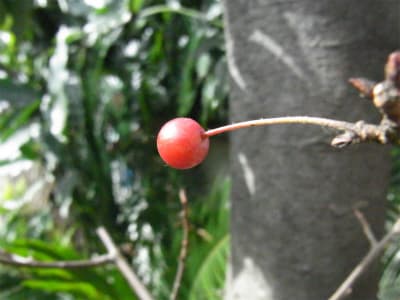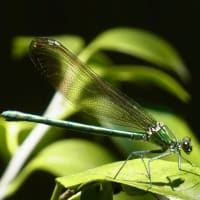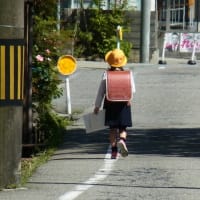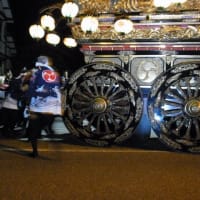■ Gustav Leonhardt グスタフ・レオンハルトが、亡くなりました ■
2012.1.20 中村洋子

( 映画でバッハ役を演じる Leonhardt )
★Gustav Leonhardt グスタフ・レオンハルトが、
亡くなりました 1928年生まれ、83歳。
Leonhardt レオンハルトの演奏は、2回聴きました。
最初は、 België ベルギーの Brugge ブルージュ、
2回目は、東京です。
★1980年代半ばに聴きました、ブルージュでの演奏は、感動的でした。
会場は、貴族の館だった美しい建物の大広間でした。
二百人も入れば満員になる優美な部屋で、起伏はなく床は平らです。
聴衆が、Cembalo チェンバロを取り囲むように、座ります。
西洋絵画に、リストやシューベルトの演奏に聴き入る人々の、
様子を描いた作品が、ありますが、
まさにその光景の中に、私は座っていました。
★ Leonhardt は、 Bachのみならず、
たくさんのバロック作曲家の作品を、弾きました。
本当に、熱のこもった演奏でした。
Cembalo チェンバロの共鳴や唸りの音まで、伝わってきました。
Leonhardt レオンハルトの息づかいまで、聞こえそうでした。
親密で、豊かなコンサートでした。
★その感動をまた、味わいたいと思い、
その後、 Leonhardt レオンハルトが来日された際、
東京の一般ホールで開催されたコンサートに、出かけました。
しかし、ブルージュの貴族の館での演奏とは、大きく異なり、
まるで、隣室で演奏されているかのような、
希薄な音で、よそよそしい感じすら受けました。
★やはり、Cembalo チェンバロはそれにふさわしい部屋で、
聴かなければ、真価が分からない、
汎用の大きなホールでは、無理なことが多い、と実感しました。

★しかし、数年前のことですが、
東京・小石川の名刹 「 伝通院 」 の本堂で、
私の企画による演奏会を、開く機会に恵まれました。
ちょうど、 「 モモセハープシコード 」 様から、
素晴らしい Cembalo チェンバロを、お借りすることが可能でしたので、
わざわざ、本堂まで搬入していただき、
Bach の Invention や私の作品を、演奏をすることができました。
★ 「 伝通院 」 の本堂は、美しい檜の厚板が敷かれた床面、
「 能楽堂 」 並みの、素晴らしい音響効果の舞台だったのです。
あの Brugge ブルージュを思い出す、チェンバロ本来の音響を
聴衆の皆さまとともに、楽しむことができました。
★最近は、あまりピアノリサイタルに出かけません。
まるで、ガラスが割れるような破壊的な、
感性が狂わされてしまうような響きを、聴くことが多く、
それが嫌さに、足が遠のいています。
★上野・東京文化会館の、暖かい音は好きですが、
新しく出来ましたホールは、たいてい、
“ 音響学の粋を集めて ” などと、宣伝されていますが、
実際は、“ 暴力的な音 ” が襲いかかってくる経験が、多いのです。

★Jean-Marie Straub と Danièle Huillet 夫妻の監督による、
Johann Sebastian Bach バッハ ( 1685~1750 ) の、
後半生を描いた映画 「 Chronik der Anna Magdalena Bach
アンナ・マグダレーナ・バッハの年代記 」 (1967年製作) で、
Leonhardt レオンハルトは、Bach バッハ役 を、
見事に、演じています。
( この映画の日本語タイトルは 「 日記 」 となっておりますが、
意味が少し、異なってしまいます )
★私は、この映画を1985年、都内で鑑賞しました。
Bach が Orchestral Suites 管弦楽組曲 を献呈した
Leopold von Anhalt-Köthen ケーテン侯レーオポルトは、
あの Nikolaus Harnoncourt ニコラス・アーノンクールが、演じていました。
★ Bach の曲がたくさん演奏され、そこに、
Anna Magdalena の ナレーションと、 Bach の手紙の朗読が、
かぶさって、流れます。
★モノクロ映画でしたが、 Bach の手紙は、彼がいかに
≪ 嫉妬や迫害の中で生活し、 怒りに燃えつつも、
それに耐えていたか ・・・≫、それを、綿々と語っています。
つい先日、Beethoven ベートーヴェン(1770~ 1827)の、
手紙が発見された、というニュースが流れていましたが、
その手紙も内容は 、「 病気と貧乏 」 しか書かれていません。
ーーーーーーーーーーーーーーーーーーーーーーーーーーーーーーーーーーーーーーーーー
■困窮と病気で苦悩 ベートーベン1823年の手紙発見
980万円以上の価値 2012.1.13
ドイツ北部のリューベック音楽大ブラームス研究所は13日までに、作曲家ベートーベン(1770~1827年)の手紙が見つかったことを明らかにした。知人宛てに書かれ、経済的な困窮と病気に苦しんでいると訴えている。
同研究所によると、ベートーベンが自身の苦悩をつづった手紙が見つかるのは珍しく、10万ユーロ(約980万円)以上の価値があるという。
手紙は1823年7月にウィーンからパリ在住の知人の作曲家に宛てられた。給料が少なく目の調子が悪いと不満を述べた上で「幸運をつかむために努力しなければならない」とつづられている。さらに同年に完成させた宗教曲の大作「ミサ・ソレムニス(荘厳ミサ曲)」の買い手がいないか尋ねている。手紙は計6枚で、印章も押されている。この作曲家のひ孫が亡くなり、研究所に寄贈された遺品の中から見つかった。(共同)
ーーーーーーーーーーーーーーーーーーーーーーーーーーー
★「980万円以上の価値 」とは、なんという皮肉でしょうか。

★Bach の手紙も同様に、憤りや困窮を訴えるものがほとんどです。
以下は、映画「 Chronik der Anna Magdalena Bach 」で、朗読された
手紙の一部です。
1725年、 Bach 40歳、ライプツィヒでカンタータ42番を作曲した頃、昔の友人に宛てた手紙。
「神の意思と思ってこの町で我慢している。仕事の内容は、聞いていたのとは異なり、特別手当もあまり支給されない。物価はとても高い。音楽に献身的な上司もいない。私は常に怒りに耐え、嫉妬や迫害のなかで生活しなければならない。神のご庇護により、他の地で幸せを探すしかないようだ。
もし、君の主人が、私のために推薦状を書いてくれるのならば有難い。
御主人に満足していただけるよう、最善を尽くすことを、君に約束します。
現在、私は700ターラーの報酬で、多くの葬式があると手当も増えるが、
一昨年のように、気候がよく葬式が少ないと、100ターラー以上も手当が減る。
チューリンゲンなら、400ターラーあれば、ここでその倍額を使う以上の生活ができるであろう」
★ Bach の至高の作品である 「 MESSE in h-moll ロ短調ミサ 」 のうちの、「 キリエ 」 と 「 グロリア 」 が作曲された1733年、新しい選挙候に出した手紙 ( 「 キリエ 」 は、亡くなったドレスデン選挙侯への追悼曲、「 グロリア 」 は、新選挙侯を祝賀するための献呈曲)
「私は、現在まで数年の間、ライプツィヒの両中央教会で音楽監督を勤めてきました。しかし、一度ならず、身に覚えのない中傷を受け、そのたびに当然与えられるべき手当をいただけないでいます。もし、陛下が寛大なお心をお示しになり、私に『宮廷作曲家』の称号をお与えになるのでしたら、問題は解消いたします。その旨、布告を賜りますよう嘆願申し上げます。恥ずかしいお願いでありますが、もし叶えられましたら、
私は、陛下への永遠の崇拝と、生涯の忠誠を誓います。陛下のご要望には、何時何なりとも、教会音楽であれ、宮廷楽団であれ、最善を尽くします。その称号に決して劣らないよう、
お仕えする所存です。」
★「 Weihnachts-Oratorium クリスマスオラトリオ」 を作曲1734~35年頃、
「 トーマス学校内の教区監督室 」 への Bach の手紙
「校長は、第1合唱隊長のキトラーに対し、別の合唱隊に行け!、と
厳しい処罰をにおわせて脅している。そして、あのクラウゼという男を、
私に何の断りもなく、第1合唱隊長にしようとしている。これは、明らかに不正行為で、到底容認できません。教会での演奏曲は、第1合唱隊が練習してきたもので、そのほとんどは、私が作曲しました。
それらは、他の合唱曲より比較にならないほど難しく、複雑です。
どうか、お力添えと保護をお願いいたします。」
アンナのナレーションでは次のように続きます。
≪しかし、校長は「クラウゼの指揮以外では、歌っていけない、さもないと、
厳罰に処すると、合唱隊を脅かした。その午後の説教で、Johann Sebastian に対し、酷い非難をしました。 処罰を恐れ、生徒は誰一人歌おうとしませんでした≫
★人類の宝ともいうべき Bach バッハや、
Beethoven ベートーヴェンが、かくも、
経済的困窮で、苦しんでいました。
悲しく、痛ましい事実です。
★Bach役の Leonhardt レオンハルトは、ほとんど言葉を発せず、
ひたすら、 Bach を演奏し、指揮をするのみでした。
≪ Bach に逸話は必要ない、必要なのは音楽のみ ≫ という、
メッセージが、彼の背中から、漂ってくるようでした。

ーーーーーーーーーーーーーーーーーーーーーーーーーーーー
■グスタフ・レオンハルト氏 オランダの鍵盤楽器奏者
2012年1月18日
グスタフ・レオンハルト氏(オランダの鍵盤楽器奏者)オランダ・メディアによると16日、アムステルダムで死去、83歳。死因は不明。
チェンバロによるバッハ演奏の世界的権威。28年オランダ生まれ。50年にウィーンでチェンバロ奏者としてバッハの作品を演奏してデビュー。71~90年にかけて指揮者のニコラウス・アーノンクールと協力してバッハのカンタータ全集を録音した。バッハの半生を描いた67年製作の映画「アンナ・マグダレーナ・バッハの日記」でバッハを演じた。
昨年5月に来日し、チェンバロ、オルガンのリサイタルを開いたが、12月にコンサート活動の終了を宣言していた。 (共同)
ーーーーーーーーーーーーーーーーーーーーーーーーーーーー
■Gustav Leonhardt obituary
Harpsichordist at the heart of the early music movement
Lionel Salter
http://www.guardian.co.uk/music/2012/jan/17/gustav-leonhardt
guardian.co.uk, Tuesday 17 January 2012 18.55 GMT
Article history
Gustav Leonhardt poses before a concert at the French Academy of Villa Medici, Rome, in 2009. Photograph: Franco Origlia/Getty Images Europe
Throughout the second half of the 20th century, Gustav Leonhardt, who has died aged 83, was a pioneer and pillar of the early music movement. As a harpsichordist, organist, scholar, conductor and teacher, he was a major figure, exercising very considerable influence on his contemporaries and juniors, and in particular making the Netherlands a focal centre for the performance of Baroque music, gathering round himself artists such as the recorder virtuoso Frans Brüggen, the viola da gamba player and cellist Anner Bylsma, the cellist and conductor Nikolaus Harnoncourt and the Kuijken brothers – Barthold, Sigiswald and Wieland – all now pre-eminent in their fields.
Himself an intensely serious-minded musician, Leonhardt sought to present 17th- and 18th-century music on period instruments or copies thereof, and in accordance with the performance practice of those times, without concessions to later tastes – though he once said (perhaps somewhat questionably): "If one manages to be convincing, the interpretation sounds authentic: if one strives to be authentic, one will never be convincing."
His own playing was marked by superlative technical assurance, lucidity, intellectual authority and gravitas – gaiety and humour came less easily to him – and initially he was criticised for too coolly dispassionate and austere a style: later, however, he himself acknowledged that he might have been over-severe and adopted a more relaxed, more expressive approach.
Many of today's leading harpsichordists were pupils of his, which sometimes led to awkward situations when he was on the jury of international competitions. One particular area in which he made a valuable contribution was the series of records of all Bach's cantatas that he and Harnoncourt conducted between 1972 and 1990 – a vast intégrale only later copied by others.
Leonhardt was born in 's-Graveland, near Hilversum. During the German occupation of the Netherlands in the second world war, he was unable to leave the house for nine months, sleeping on boards between the floors and with someone always on lookout. At the age of 18, after a brief classical education, he entered the Schola Cantorum Basiliensis, in Switzerland, whose director was the conductor and musical patron Paul Sacher, to study organ and harpsichord with Eduard Müller and ensemble playing with August Wenzinger: three years later he went to Vienna to study conducting with Hans Swarowsky.
In 1950 he made his debut in Vienna playing Bach's Art of Fugue, which he stoutly maintained had been intended for the harpsichord, but of which the final incomplete fugue did not form part: he wrote a monograph on the subject and, 30 years later, recorded the work. He rapidly made a name as a harpsichordist, at the age of 24 became professor of the instrument at the Vienna Academy of Music, and the following year at the Amsterdam Conservatoire. There he settled permanently and was appointed organist at the Waalse Kerk, which boasted a splendid organ of 1733.
Around this time he started making his numerous recordings – a concerto by Johann Christian Bach under Sacher, the first of what would eventually be three recordings of Bach's Goldberg Variations – and, with a small ensemble, discs with the English contertenor Alfred Deller, from whom he declared he learned much about nuance and phrasing. He also formed the Leonhardt Consort, which, for 20 years, made historical instruments the norm for this period of the repertoire to such an extent that he later declared: "If you hear a modern violin, you are almost startled."
A bewigged Leonhardt playing the cadenza from the first movement of Bach's Fifth Brandenburg Concerto at the start of the film Die Chronik der Anna Magdalena Bach
A busy life was filled with concerts and recordings in Europe and the US, which he visited almost every year. In 1962, and again in 1969, he was visiting professor at Harvard University, and in 1968 appeared as Johann Sebastian Bach (to whom, however, he bore no facial resemblance) in Jean-Marie Straub and Danièle Huillet's film Die Chronik der Anna Magdalena Bach. Often considered the finest Bach interpreter of his generation, Leonhardt performed a vast number of his compositions, not only keyboard and chamber music but also major works such as the B minor Mass, the Easter Oratorio and the St Matthew Passion.
However, his interests were by no means confined to Bach: among composers he regarded as his favourites were Frescobaldi, Froberger, Louis Couperin, Sweelinck (whose fantasias and toccatas he edited) and Rameau, all of whom he recorded with his usual scholarship and nobility; and to these may be added the names of Purcell, Byrd, Biber and CPE Bach. Among works he conducted were Rameau's Pygmalion, Lully's Bourgeois Gentilhomme and Campra's L'Europe Galante; and he made valuable recordings on historic organs in the Netherlands, north Germany and the Alpine region.
The general admiration in which he was held did not, however, preclude some criticism of excessive sobriety – the wit of French claveçinists seemed to elude him – of rather unsettling free rubatos, and in concerted works of over-heavy accentuation; and he puzzled many by his reluctance to play repeats in his recordings. But although it was through these that he reached the majority of music-lovers, his readings were generally more spontaneous in live performances, which continued until last December.
He is survived by his violinist wife, Marie.
• Gustav Leonhardt, harpsichordist, organist and conductor,
born 30 May 1928; died 16 January 2012
※copyright © Yoko Nakamura
▼▲▽△無断での転載、引用は固くお断りいたします▽△▼▲

























